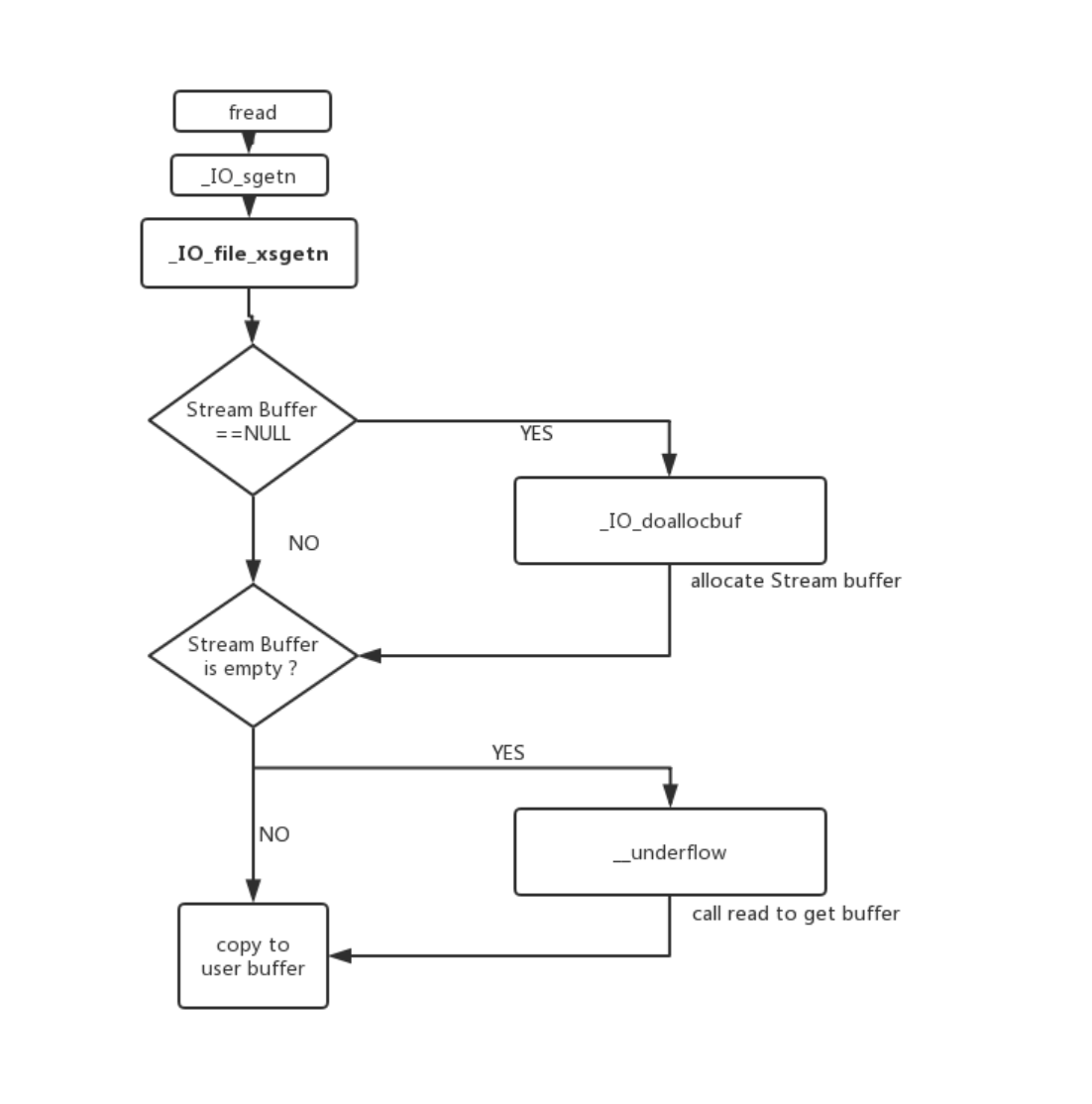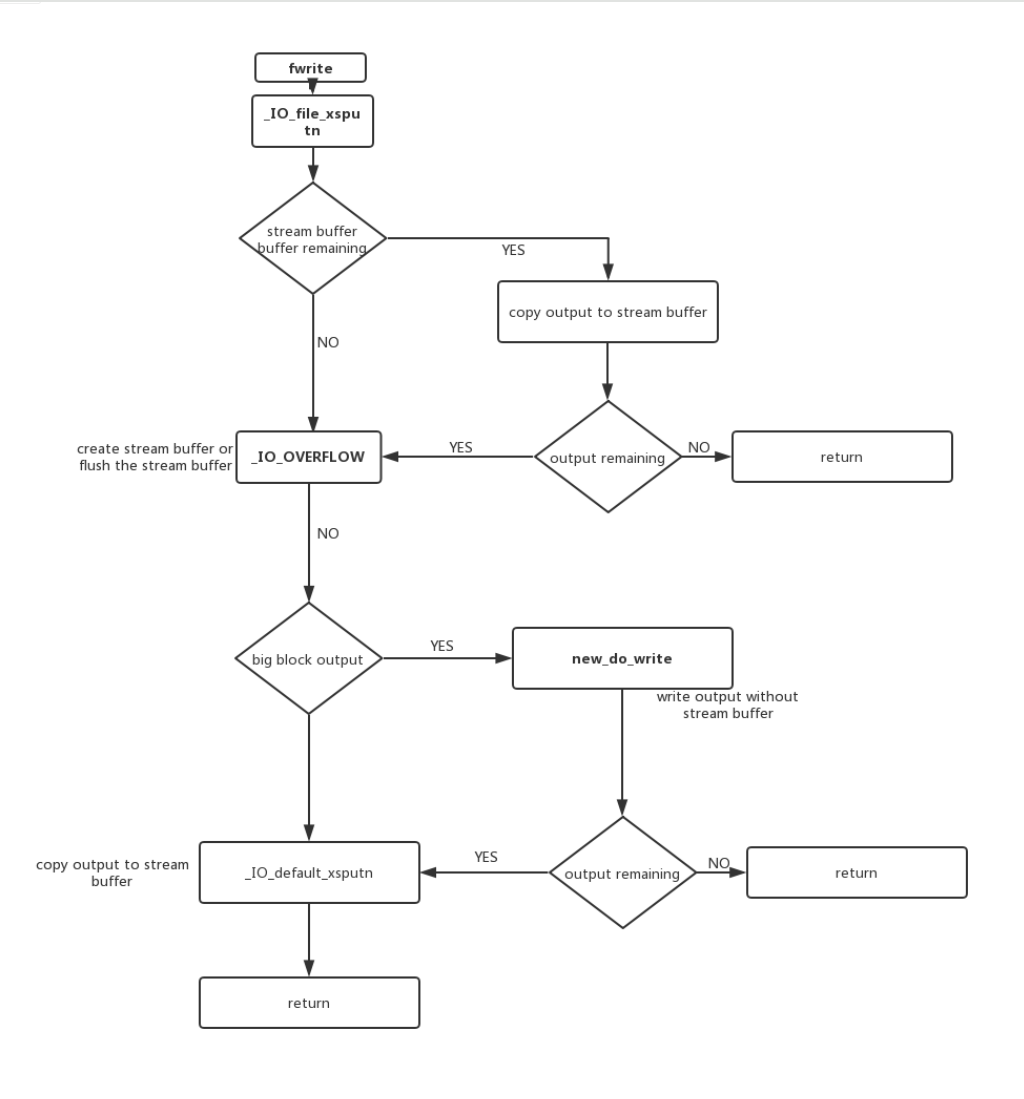size_t
_IO_fwrite (const void *buf, size_t size, size_t count, FILE *fp)
{
size_t request = size * count;
size_t written = 0;
CHECK_FILE (fp, 0);
if (request == 0)
return 0;
_IO_acquire_lock (fp);
if (_IO_vtable_offset (fp) != 0 || _IO_fwide (fp, -1) == -1)
written = _IO_sputn (fp, (const char *) buf, request);
_IO_release_lock (fp);
if (written == request || written == EOF)
return count;
else
return written / size;
}
size_t
_IO_new_file_xsputn (FILE *f, const void *data, size_t n)
{
const char *s = (const char *) data;
size_t to_do = n;
int must_flush = 0;
size_t count = 0;
if (n <= 0)
return 0;
if ((f->_flags & _IO_LINE_BUF) && (f->_flags & _IO_CURRENTLY_PUTTING))
{
count = f->_IO_buf_end - f->_IO_write_ptr;
if (count >= n)
{
const char *p;
for (p = s + n; p > s; )
{
if (*--p == '\n')
{
count = p - s + 1;
must_flush = 1;
break;
}
}
}
}
else if (f->_IO_write_end > f->_IO_write_ptr)
count = f->_IO_write_end - f->_IO_write_ptr;
if (count > 0)
{
if (count > to_do)
count = to_do;
f->_IO_write_ptr = __mempcpy (f->_IO_write_ptr, s, count);
s += count;
to_do -= count;
}
if (to_do + must_flush > 0)
{
size_t block_size, do_write;
if (_IO_OVERFLOW (f, EOF) == EOF)
return to_do == 0 ? EOF : n - to_do;
block_size = f->_IO_buf_end - f->_IO_buf_base;
do_write = to_do - (block_size >= 128 ? to_do % block_size : 0);
if (do_write)
{
count = new_do_write (f, s, do_write);
to_do -= count;
if (count < do_write)
return n - to_do;
}
if (to_do)
to_do -= _IO_default_xsputn (f, s+do_write, to_do);
}
return n - to_do;
}
int
_IO_new_file_overflow (FILE *f, int ch)
{
if (f->_flags & _IO_NO_WRITES)
{
f->_flags |= _IO_ERR_SEEN;
__set_errno (EBADF);
return EOF;
}
if ((f->_flags & _IO_CURRENTLY_PUTTING) == 0 || f->_IO_write_base == NULL)
{
if (f->_IO_write_base == NULL)
{
_IO_doallocbuf (f);
_IO_setg (f, f->_IO_buf_base, f->_IO_buf_base, f->_IO_buf_base);
}
if (__glibc_unlikely (_IO_in_backup (f)))
{
size_t nbackup = f->_IO_read_end - f->_IO_read_ptr;
_IO_free_backup_area (f);
f->_IO_read_base -= MIN (nbackup,
f->_IO_read_base - f->_IO_buf_base);
f->_IO_read_ptr = f->_IO_read_base;
}
if (f->_IO_read_ptr == f->_IO_buf_end)
f->_IO_read_end = f->_IO_read_ptr = f->_IO_buf_base;
f->_IO_write_ptr = f->_IO_read_ptr;
f->_IO_write_base = f->_IO_write_ptr;
f->_IO_write_end = f->_IO_buf_end;
f->_IO_read_base = f->_IO_read_ptr = f->_IO_read_end;
f->_flags |= _IO_CURRENTLY_PUTTING;
if (f->_mode <= 0 && f->_flags & (_IO_LINE_BUF | _IO_UNBUFFERED))
f->_IO_write_end = f->_IO_write_ptr;
}
if (ch == EOF)
return _IO_do_write (f, f->_IO_write_base,
f->_IO_write_ptr - f->_IO_write_base);
if (f->_IO_write_ptr == f->_IO_buf_end )
if (_IO_do_flush (f) == EOF)
return EOF;
*f->_IO_write_ptr++ = ch;
if ((f->_flags & _IO_UNBUFFERED)
|| ((f->_flags & _IO_LINE_BUF) && ch == '\n'))
if (_IO_do_write (f, f->_IO_write_base,
f->_IO_write_ptr - f->_IO_write_base) == EOF)
return EOF;
return (unsigned char) ch;
}
int
_IO_new_do_write (FILE *fp, const char *data, size_t to_do)
{
return (to_do == 0
|| (size_t) new_do_write (fp, data, to_do) == to_do) ? 0 : EOF;
}
libc_hidden_ver (_IO_new_do_write, _IO_do_write)
static size_t
new_do_write (FILE *fp, const char *data, size_t to_do)
{
size_t count;
if (fp->_flags & _IO_IS_APPENDING)
fp->_offset = _IO_pos_BAD;
else if (fp->_IO_read_end != fp->_IO_write_base)
{
off64_t new_pos
= _IO_SYSSEEK (fp, fp->_IO_write_base - fp->_IO_read_end, 1);
if (new_pos == _IO_pos_BAD)
return 0;
fp->_offset = new_pos;
}
count = _IO_SYSWRITE (fp, data, to_do);
if (fp->_cur_column && count)
fp->_cur_column = _IO_adjust_column (fp->_cur_column - 1, data, count) + 1;
_IO_setg (fp, fp->_IO_buf_base, fp->_IO_buf_base, fp->_IO_buf_base);
fp->_IO_write_base = fp->_IO_write_ptr = fp->_IO_buf_base;
fp->_IO_write_end = (fp->_mode <= 0
&& (fp->_flags & (_IO_LINE_BUF | _IO_UNBUFFERED))
? fp->_IO_buf_base : fp->_IO_buf_end);
return count;
}
size_t
_IO_default_xsputn (FILE *f, const void *data, size_t n)
{
const char *s = (char *) data;
size_t more = n;
if (more <= 0)
return 0;
for (;;)
{
if (f->_IO_write_ptr < f->_IO_write_end)
{
size_t count = f->_IO_write_end - f->_IO_write_ptr;
if (count > more)
count = more;
if (count > 20)
{
f->_IO_write_ptr = __mempcpy (f->_IO_write_ptr, s, count);
s += count;
}
else if (count)
{
char *p = f->_IO_write_ptr;
ssize_t i;
for (i = count; --i >= 0; )
*p++ = *s++;
f->_IO_write_ptr = p;
}
more -= count;
}
if (more == 0 || _IO_OVERFLOW (f, (unsigned char) *s++) == EOF)
break;
more--;
}
return n - more;
}
|

